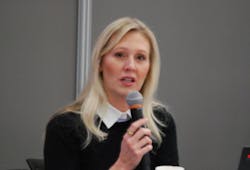Many industries—including process control and automation—are starving for people. Millions of skilled jobs are going unfilled, and many employers are at their wit’s end about how to fill them.
To help alleviate this persistent crisis, Rockwell Automation reports it has several remedies. These include applying labor-saving automation to reduce manual tasks, but also employing advanced digitalization including artificial intelligence (AI) to enable less-experienced staffers to succeed in technically sophisticated jobs where they likely didn’t have the tools to succeed before.
“Automation has been changing the nature of work since the 1860s, and it’s not stopping because we’re seeing even faster proliferation now,” said Kyle Crum, director of advanced technology, Rockwell Automation. “When spreadsheets were introduced in the 1970s, there was lots of talk that accounting was dead. However, while there was less bookkeeping, even more jobs were eventually created. Likewise, manual parts-checking on production lines is shifting to having the person calibrate the machine that checks the parts and do other value-added activities instead of repetitive work. So work isn’t collapsing, it’s just changing again.”
Tessa Myers, senior vice president of intelligent devices at Rockwell Automation, added that every company and executive she meets with is concerned about the skilled workforce shortage. “Automation technology can enable workforces, so our path is to develop and attract talent to fill the gaps in those skilled workforces,” said Myers. “We’re also investing in the communities where we and our customers work and live, and supporting students in Science, Technology, Engineering and Math (STEM) programs such as For Inspiration and Recognition of Science and Technology (FIRST) Robotics.”
Myers and Crum presented the “Why the manufacturing workforce is more important than ever” press conference this week at Automation Fair 2023 in Boston.
Retraining, people skills crucial, too
Beyond finding new people, Crum reported that many companies also need to retrain their existing personnel and give them the skills that U.S. manufacturing operations will require in the future. “For the past several years, Rockwell Automation has partnered with the Manpower Group in an Academy of Advanced Manufacturing (AAM) program to train and retrain U.S. military veterans in the skills they need to work in smart manufacturing,” explained Crum. “This is a 12-week course, and so far we have placed all of its graduates with companies across the nation.”
Similarly, Rockwell Automation also operates its own workforce development and enablement program. It puts employees on the pathway to gaining the skills they need, which has also proven to be a good way of retaining them.
“There are concerns that the skills that will be necessary in the future are mainly hardcore, technical competencies, but people skills are essential for coordinating all the other competencies,” Myers said. “Many manufacturing problems are very complex, with multiple facets, and draw on many disciplines,” she said. “This means that many soft skills are necessary, too. Team leaders need emotional intelligence and the ability to work well with others, so they can get their teams aligned to solve those complex problems.”
Crum added that Rockwell Automation also plans to emulate some of the micro-certification and reeducation efforts that many IT-based companies already practice. “These are similar to the nursing programs that provide training as stackable credentials,” he said.
“We think AI can also enable these types of performance and workforce improvements, and make personnel more effective,” added Myers. “For example, AI can help people learn our FactoryTalk Design Studio software-as-a-service (SaaS) design tool, or apply FactoryTalk Guardian AI software to their assets for better predictive maintenance.”


